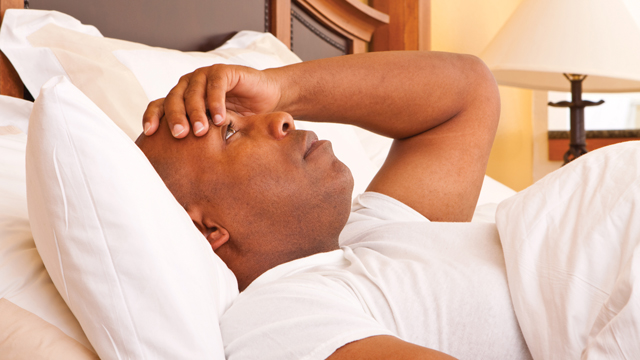As the most common sleep disorder in America, insomnia affects about two out of every ten Americans. If you have insomnia, most nights you might have trouble falling asleep, staying asleep, or both. The sleep you get is often broken and falls short of the recommended seven to eight hours. You lie awake in bed at night, and might awaken earlier than you desire with an inability to fall back asleep. To make matters worse, because of your insomnia, you don’t feel refreshed upon awakening, and may feel anxious, depressed, irritable, less able to concentrate, and fatigued during the next day.
A few weeks of bad sleep can morph into chronic insomnia.
Everyone has experienced short-term insomnia brought on by situations like travel, birth of a child, death of a loved one, injury, stress at work, or other recent trauma. Short-term insomnia usually resolves on its own within days or weeks, unless a person develops habits – like taking naps, worrying incessantly about sleep, or getting in bed too early – in an attempt to get more sleep. When this happens, a cycle of chronic insomnia can start.
Hyper-worrying can make matters worse.
Those who sleep too little are at risk for dangerous daytime drowsiness, which increases risks for vehicle crashes and workplace injury. They are also at increased risk for cardiovascular disease, cancer, mental health concerns, and reduced life expectancy.
Basically, whether it’s temporary or long-term, poor sleep patterns can be harmful – even fatal. With these risks, it is no wonder people suffering with chronic insomnia are highly concerned and focused on their lack of sleep. They are motivated to fix their sleep and often will direct energy, time, and money into this effort. Every option seems viable: gadgets, special pillows, beds, herbal remedies, and pharmacologic medications. Also, people with insomnia often arrange their social, family, and work schedules in an attempt to accommodate more time to sleep. Yet, the more they try to force sleep, the less likely it is to come.
Why is this? When something is broken or needs improvement, a typical approach is to focus specifically on the broken thing and direct energy and resources to fix the problem. For example, to lower blood cholesterol, reducing dietary cholesterol directly can help. To improve cardiovascular fitness, one might exercise at the gym to strengthen muscles and enhance lung capacity. However, in the case of sleep, all the intensive focus on fixing sleep, and the concentration on the dangers associated with poor sleep, results in worry, anxiety, and irritability. This hyper-arousal of mind and body actually fuels the insomnia cycle making one unable to relax enough for sleep to come naturally.
Also, while very well intentioned, certain habits – like taking naps, sleeping in on weekends, and staying in bed when unable to sleep – interfere with a natural and healthy sleep schedule. Many times, people with insomnia need professional help to escape the cycle.
Focus less on sleep and more on creating the right conditions.
While counterintuitive, the best approach to help insomnia sufferers improve their sleep is to focus less directly on sleep and the negative consequences of poor sleep, and more on an overall lifestyle change that promotes the conditions necessary for sleep to occur naturally. An extensively researched evidence-based treatment called cognitive behavioral therapy for insomnia (CBT-I) trains people to change behaviors and to learn and use techniques that address problematic ways of thinking and worrying associated with insomnia. The treatment also gives people tools they can use to calm their bodies and minds, and to overcome the worry and other negative emotions that accompany the experience of being unable to sleep.
It works so well that it is now recommended as the first-line treatment, even before medications. It works quickly, usually within several months. To learn more about CBT-I, visit the National Sleep Foundation at sleepfoundation.org, or contact a provider trained in behavioral sleep medicine and CBT-I, listed at behavioralsleep.org.
As you lie awake – trying not to ponder what you hope is short-term insomnia – take heart that you are not alone and that treatments exist to improve your sleep habits.




